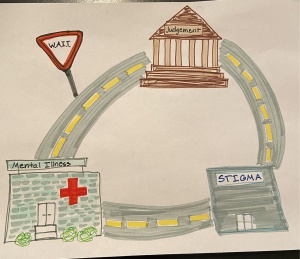Stigmatization and Schizophrenia
Schizophrenia, as well as other psychotic and mental illnesses, are often the targets of stigmatization. It is unfortunately very common for those with Schizophrenia, or many other invisible illnesses for that matter, to face some form of stigmatization. Stigmatization, known as a group of stereotypes correlated with false beliefs, negative attitudes, and fears about a Schizophrenia diagnosis which results in the perception and comprehension of the disorder by others https://www.ncbi.nlm.nih.gov/pmc/articles/PMC2659317/. Stigmatization, which is often characterized as an external risk factor that can project its characteristics in many ways, may impact someone after they are given a diagnosis, but also can happen prior to a diagnosis, through small and subtle behavioral expressions of Schizophrenia https://www.ncbi.nlm.nih.gov/pmc/articles/PMC2659317/. An example may be judging someone due to speech differences or behavior that is stereotypically linked to Schizophrenia.
For Every Action, there is an Equal and Opposite Reaction
For one struggling with Schizophrenia, these harsh and false beliefs from others is hypothesized to cause negative psychological outcomes in the mentally ill, including those with Schizophrenia. https://www.ncbi.nlm.nih.gov/pmc/articles/PMC2659317/ Those with mental illness are already often socially rejected, which has a great impact on one’s general well-being and self-esteem. Someone may feel more depressed, anxious, isolated, embarrassed, scared, or angry. It is not unlikely for those with Schizophrenia to also have a social anxiety related disorder, so this added stigma only perpetuates the already isolating and adverse journey of Schizophrenia. Also, stigma only stops others from getting the help that they need.
What can be done?
Like most of us were instilled growing up, “Treat others how you would want to be treated.” How we view and treat others always comes with consequences. The choice is ours.
- W.A.I.T.: “Why am I talking?”
- Over the summer, I read a book that shared the acronym, “W.A.I.T.,” which stands for “why am I talking?” Since learning of this acronym, I have more often found myself thinking through my thoughts before blurting meaningless word jumble. Basically, think before you respond. Is what you are about to say helpful or harmful? To yourself? To others? When it comes to communicating about mental illness, ask yourself to WAIT. Figure One shows how judgement, stigma, and mental illness are all connected and how practicing “W.A.I.T.” can stop the cycle.

Figure 1: This abstract shows the stigma cycle that is often associated with mental illness and how simple techniques like “WAIT” can stop the cycle.
- Recognition Between Mental and Physical Illness
- You would not make fun of someone with cancer, a broken leg, or a physical disability. When you can recognize and understand that mental illness, like physical illness, is a disease, you may find yourself become hesitant to judge someone.
- Educate Yourself
- Before judging someone else, educate yourself. Ask someone else to share their story or personal experience, you may be surprised and humbled to learn about someone else’s journey. Always try to find the learning opportunities to help you grow in understanding and compassion for others struggles. Deepening your understanding and awareness disrupts the cycle of stigma.
- Choose Compassion
- Recognize the humanity of mental illness; the vital fact that every single human is vulnerable. We are all more alike than we are different. Choosing to show compassion through a simple, “hello” to a fellow human unifies us and reminds the world of what can happen when we choose compassion over judgement.
